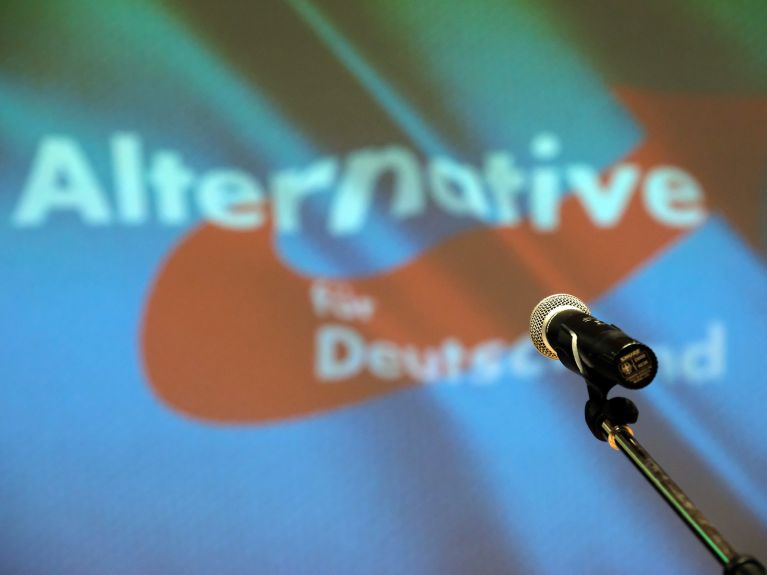Loaded language
The AfD’s populist rhetoric attracts those who are traumatized by the past and scared of the future.

In the past several years, Görlitz, a picturesque town on Germany’s eastern border with Poland, has functioned as the backdrop to several major Hollywood films, including Around the World in 80 Days starring Jackie Chan and Arnold Schwarzenegger, The Reader with Kate Winslet and David Kross and The Grand Budapest Hotel featuring Tilda Swinton and Bill Murray. However, the town’s elegant facades conceal a weak economy and scores of elderly and discontented individuals who have lost faith in the future.
Electoral success for far-right party AfD
In fact, so many “Görliwood” residents reject the EU and the political establishment in their nation’s capital that more than two-thirds of them voted for the far-right AfD party in elections held this past Sept. 1.
Nearly a million people in the states of Brandenburg and Saxony cast their ballots for the party called Alternative for Germany (AfD); that’s more than a quarter of all voters there. One out of four rallied behind politicians – both men and women – who have shocked the public with rightwing extremist, anti-Semitic, racist or otherwise inhuman remarks. Is Germany on a path back to its past?
In short, no. In the more heavily populated west, the AfD attracts far less support. Even in the AfD-friendly eastern states, nearly three-quarters of the electorate backed other parties. The AfD won neither Saxony nor Brandenburg. Plus, no other party wants anything to do with them.
The AfD had hoped and even expected to become the top vote-getter in these elections, which could have set the stage for Angela Merkel’s ouster. “Complete the revolution” was an AfD poster slogan during the campaign. To the outrage of many, the party claimed that the Peaceful Revolution, which had led to the fall of the Berlin Wall, had been betrayed and that conditions today resembled those of the communist past.
East Germany feels betrayed
Luckily, the worst has been avoided, at least for the moment. Brandenburg will once again have an SPD minister president and Saxony one from the CDU. In Berlin, Merkel will remain chancellor, probably to the end of her term – if not even longer. The CDU might need her, for lack of any charismatic successors. But what about the claim that the revolution remains incomplete? And why do so many former East Germans believe they are being shortchanged, ignored and treated like second-class citizens? The New York Times described a “lingering inequality between East and West three decades after the Berlin Wall fell.” The Washington Post wrote that the east of Germany “still suffers from higher unemployment and lower wages and pensions than the West, about 30 years after the country’s reunification.” But the truth is more complex.
lower wages and high unemployment
Saxony’s unemployment rate is 5.7 percent, and Brandenburg’s is 5.6 percent, while the national average is 5.1 percent. In the western state of North Rhine-Westphalia, the rate is 6.7 percent, with peak levels of 13.4 percent in Gelsenkirchen and 10.4 percent in Dortmund. However, average wages in the east continue to lag behind those in the west. Last year, people in Saxony and Brandenburg earned 20 percent less than the German average. There are many reasons for these discrepancies. One-third of eastern Germany’s full-time employees work in the low-wage sector – that’s twice as much as in the west.
More eastern German women work than do their western counterparts. These women earn on average 20 percent less than men. Eastern Germany has few big corporations and many rural, structurally weak and depopulated regions. On the other hand, wherever corporate headquarters are, rents are rising and so are other costs of living. Pensions, meanwhile, are based on wages – including those earned during the Communist days of old.
More reasons than empty wallets
Meanwhile, pensions in the east have risen to 96 percent of those in the west. A complex compensation scheme has now been put in place to balance pension levels by 2024. Low income does not automatically predispose people toward the AfD. The fact that most welfare recipients in Saxony live in Leipzig – where the party scored well below its average for the state – illustrates this simple insight. There are more important reasons for the rejection of “the system” and “the establishment” than empty wallets.
One such reason lies in the past, another in the present.
Even 30 years after the fall of the Berlin Wall and the subsequent incorporation of East Germany in the Federal Republic, many eastern Germans still feel betrayed and sold out. Their industries, which were no longer competitive, were handed over as gifts to west-based corporations; barely 10 percent of all jobs survived; and with no savings to speak of, many slid toward poverty.
Read the whole text on The German Times website
Peter H. Koepf is editor in chief of The German Times. Together with Franziska Schreiber he wrote the best-selling book “Inside AfD”.


